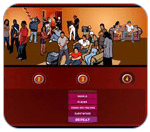Using Games in Public Health (Part 2 of "Let the Games Begin")
This week we are continuing the second part of our two-part series on video games and public health. Last week we spoke with Tina Hoff, Vice President and Director of Entertainment Media Partnerships  at the Kaiser Family Foundation, Marguerita Lightfoot
at the Kaiser Family Foundation, Marguerita Lightfoot  of the University of California, San Francisco (UCSF), and David Galiel, an expert on new media with experience in game development.
of the University of California, San Francisco (UCSF), and David Galiel, an expert on new media with experience in game development.
How can we use video games in public health?
Traditionally, most commercial resources have been devoted to games whose primary purpose is entertainment. There has been little attention to a game's educational value, and "educational games" have been relegated to a niche with little funding and few professional game developers. This has begun to change, however, with the advent of the "Games for Good" movement, which has drawn game developers interested in using the immersive, participatory nature of video games in the public interest.
Marguerita Lightfoot believes there is tremendous potential in using games for public health. As a behavioral scientist, she is interested in using games to change behaviors, as opposed to simply supplying information. She said, "It takes more than information. We have to ask ourselves, how can we use technologies to really change behavior?"
In the health arena, games have been used to educate patients about medication and their particular disease or condition. Games have also been used as a form of public education to inform about health risks, to provide basic public health education, and to increase understanding of (and empathy for) individuals suffering from various maladies.
How can we use video games in the fight against HIV/AIDS?
Video games can raise awareness about HIV/AIDS, help change public attitudes, and spark discussion. They can teach about, and encourage, safe behavior through in-game rewards and goals. Most important, they can reach an audience that is increasingly tuning out traditional media (e.g., television and radio). Online games can be a cost-effective way of reaching very large populations without the significant distribution costs associated with offline education.
Tina Hoff told us, "Pos or Not  is an analogue to the popular online viral game, Hot or Not
is an analogue to the popular online viral game, Hot or Not  , and was designed to engage young people in more personal ways about HIV and more specifically about who it affects."
, and was designed to engage young people in more personal ways about HIV and more specifically about who it affects."
The Kaiser Family Foundation and MTVU  , MTV's college network, worked with young people across the U.S. as part of a competition to generate ideas that ultimately led to the development of Pos or Not. Now that the game is live, players are invited to share comments and new ideas for extending its reach. When we asked her about the response to the game so far, Tina said, "In the first 24 hours, we had nearly to 200,000 unique visitors play, and more people keep coming every day to play and offer comments and new ideas."
, MTV's college network, worked with young people across the U.S. as part of a competition to generate ideas that ultimately led to the development of Pos or Not. Now that the game is live, players are invited to share comments and new ideas for extending its reach. When we asked her about the response to the game so far, Tina said, "In the first 24 hours, we had nearly to 200,000 unique visitors play, and more people keep coming every day to play and offer comments and new ideas."
Challenges and Lessons Learned

Photo courtesy of Marguerita Lightfoot
Project Light video game
Video games have the potential to raise awareness and change behaviors, but with that potential comes challenges. As we mentioned in a recent post, Marguerita's games have been quite successful, but because she is working with schools and community-based organizations, there are challenges in scaling up her video games to reach larger audiences. She told us, "At this point video games are an emerging field, particularly in HIV. We have some indication that they work. For example, youth who completed my program reported reduced number of sexual encounters, as well as a reduced number of sexual partners. We even saw more condom use. But we're still building the evidence that this stuff works. There's a lot of research being done now on the outcomes, and we'll see more results in the next few years."
Resources
- A Fight for Life: Interactive HIV/AIDS Awareness and Prevention Game

- Food Force

- Freedom HIV/AIDS: A Social Initiative Providing HIV/AIDS Education Through Mobile Games

- Games for Change (G4C)

- Games for Change Annual Festival - June 2 -4, 2008 in NYC

- Games for Health

- Games for HIV/AIDS Training--India and Nepal

- HIV/AIDS Maze from the National Institute on Drug Abuse

- Robert Wood Johnson Foundation's Program to Research Interactive Gaming as Health Intervention Tool

- Voices for Youth: HIV/AIDS Games from Unicef










